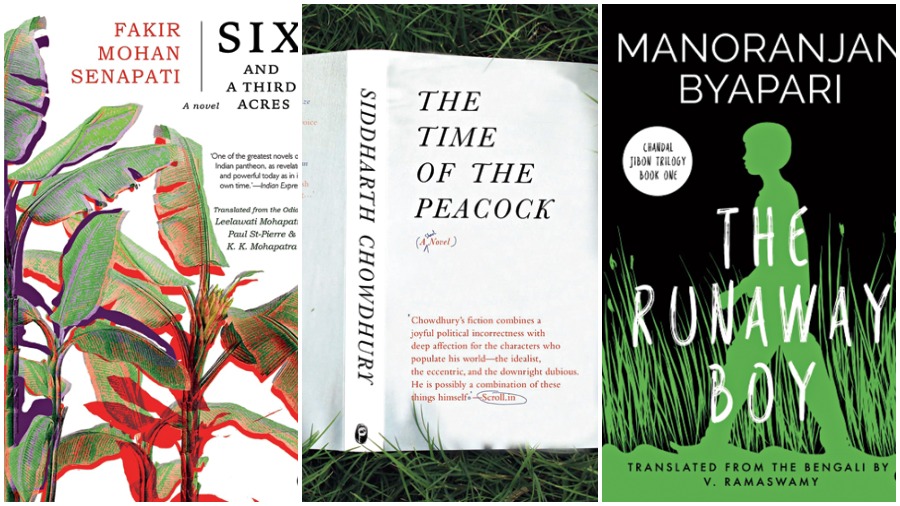The Rock Babas and Other Stories by Ameya Prabhu
Concise yet flamboyant is how one can describe Ameya Prabhu’s debut collection of stories The Rock Babas and Other Stories (Westland Books; Rs 399). Written in a language that begs to be defined as to the point, the fluff is in the emotions that the author tries to write about. The plots may seem to try and take a leaf out of O. Henry, without the final punch of a surprise ending, the stories deep-dive into the minds of characters who, like all human beings, are flawed.
In the first story, An Accidental Philanthropist, Takahashi Watanabe is an established business tycoon with an empire that commands words of warmth from the prime minister of the country. How a health diagnosis that keeps changing results in a change of heart in an otherwise ruthless, emotionless businessman, is a tale told with extreme crispness.
In Memoirs of a Dictator, a former political leader sits in the VIP cell of prison that he had himself built, writing out a letter to his countrymen, telling them about the background of his life that led to his presidency. “The western press has extensively mocked me for bestowing titles and honours upon myself. They still seem to be suffering from a colonial hangover and this is a brazen example of their racially motivated propaganda” he writes and we glimpse into the twisted justifications of an even more twisted mind. In bare minimum words, the book captures stories that are oftentimes comic and sometimes ominous. A hotelier finds new meaning to life from rock and roll playing ‘babas’ in the Himalayas, a special agent cracks a homicidal case and Dolly Nayak recounts her life from being ‘The Bengali Nightingale’ to a wedding singer in Bombay in the story The Broken Nightingale. Pick up this book if you want fast-paced reads on various kinds of lives and their pains that surround us at all times in this world.
The Time of the Peacock by Siddharth Chowdhury
Sly, cunning, witty and sharp are words that come to mind while diving into protagonist John Nair’s literary world in Siddhant Chowdhury’s book The Time of the Peacock (Aleph; Rs 499). The author and the protagonist both happen to be editors in real and fictional lives respectively, offering us a deep insight into the “goldfish bowl of the New Delhi Publishing world”. Poking fun with a stark sense of dry humour, the author recollects literary festivals, discriminations and applause — some deserved, and some not so. Nair is celebrating with a grand party, the launch of an important book by his publishing house Peacock India. However, it is the appearance of an old friend and bard Ritwik Ray, that throws the attendees as well as the readers into turmoil. Replete with names distorted to the degree of smooth recognition, Chowdhury, through his character Nair, pokes fun or comments upon every aspect of the industry, albeit with humour in tow.
The language is simple while the narrative is nuanced and layered. Narrators change like the seasons as we flit in and ahead in time through a tale which can only be weaved by a keen observer — one that Chowdhury has successfully been with his experience as an editorial consultant in New Delhi. Intellectually fun ways of poking fun at intellect and its abundance or lack thereof, hasn’t been done so smoothly in recent times. There are paid fellowships being acquired by authors who haven’t even visualised their new novel in their heads, there are flamboyant parties and vicious bidding wars with polite outward appearances. A treat for those who take keen interest in the world of publishing and are looking for a great chuckle with the finest of storytelling.
Two translations we are looking at: The Runaway Boy by Manoranjan Byapari, translated by V. Ramaswamy
Byapari’s Chandal Jibon trilogy’s first book finds a translation in English called The Runaway Boy (Westland, Rs 599). Caste atrocities, poverty, hunger, communal violence and politics of mid-20th century India is found in this book by the author who has taken home literary awards from Paschim Banga Bangla Akademi. His sharp gaze and commentary on life forms a gut-wrenching account of times gone by.
Six and a Third Acres by Fakir Mohan Senapati, translated by Leelawati Mohapatra, Paul St-Pierre and K. K. Mohapatro
Hailed to be the first modern Odia novel from 1897-99, this book by Fakir Mohan Senapati continued to command great literary value till recent times. Initially published as Chha Mana Atha Guntha in Odia, the book has now found a translation to English. Narrating the tale of a cruel zamindar Ramachandra Mangaraj, who usurps land from innocent and poor farmers, the nuanced novel unravels slowly into sadness and devastation as his eyes fall on a small piece of land belonging to a weaver couple. Six and a Third Acres (Aleph; Rs 399) is a social commentary from a time long gone, whose relevance still outshines its narration.










